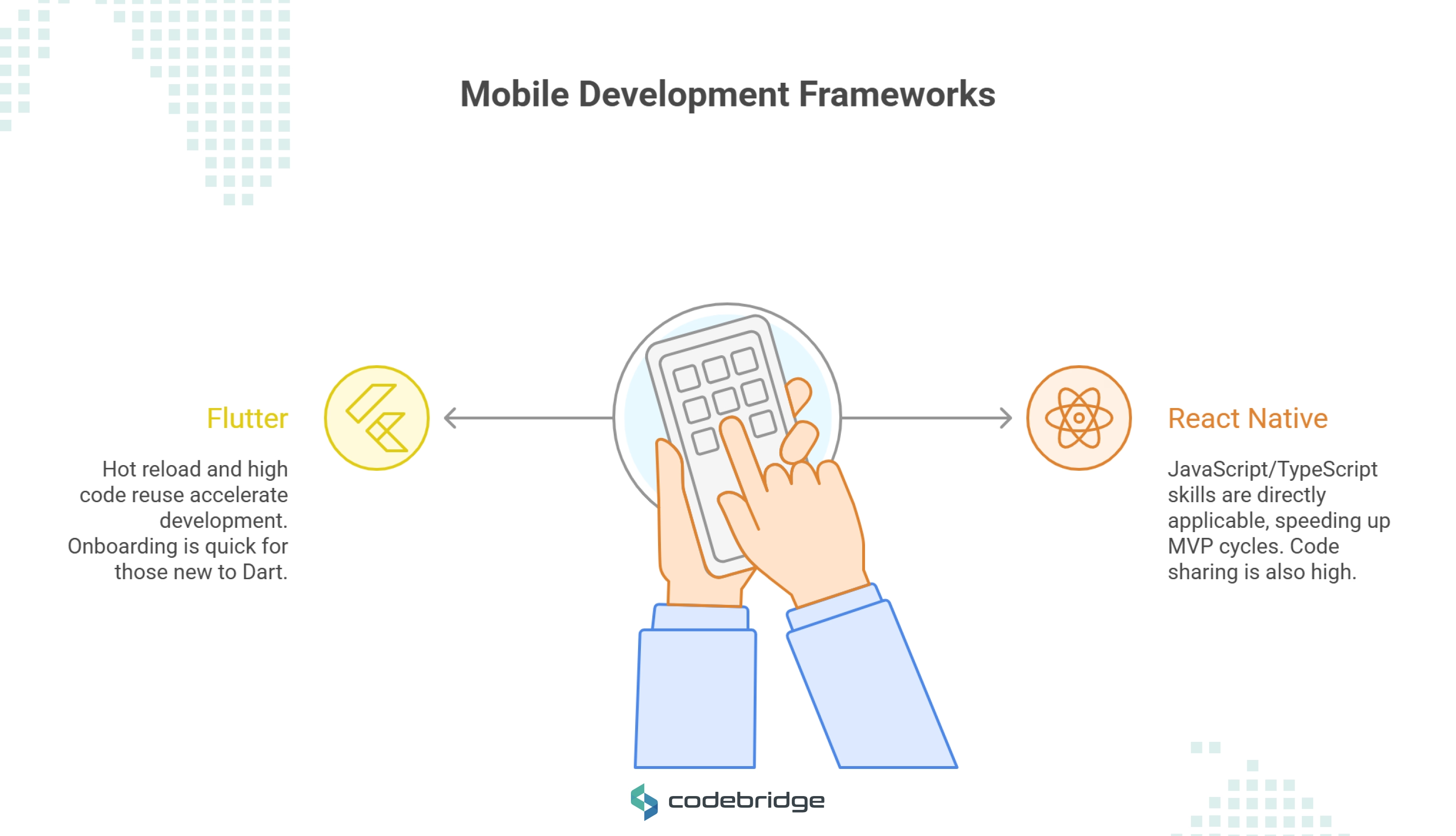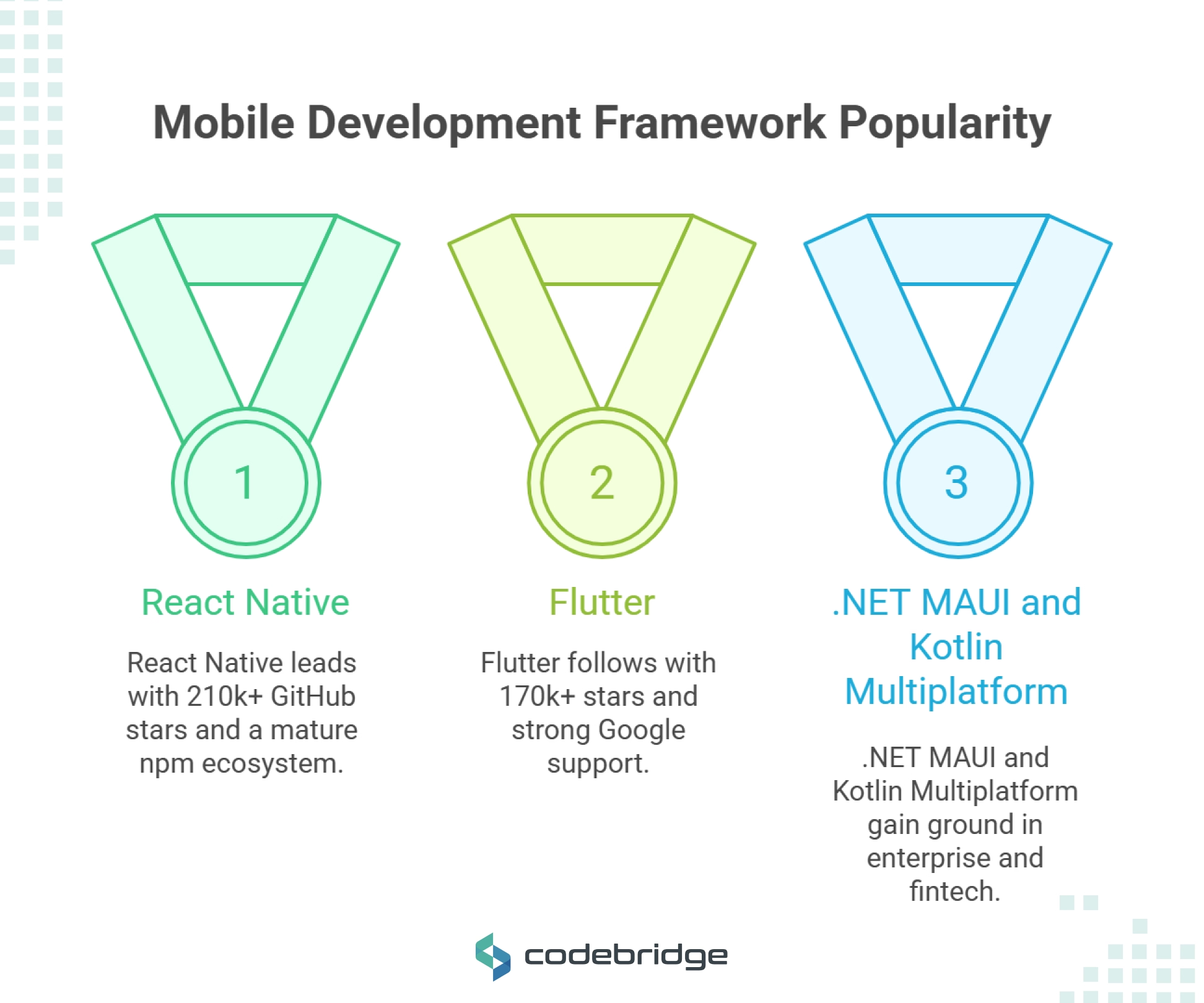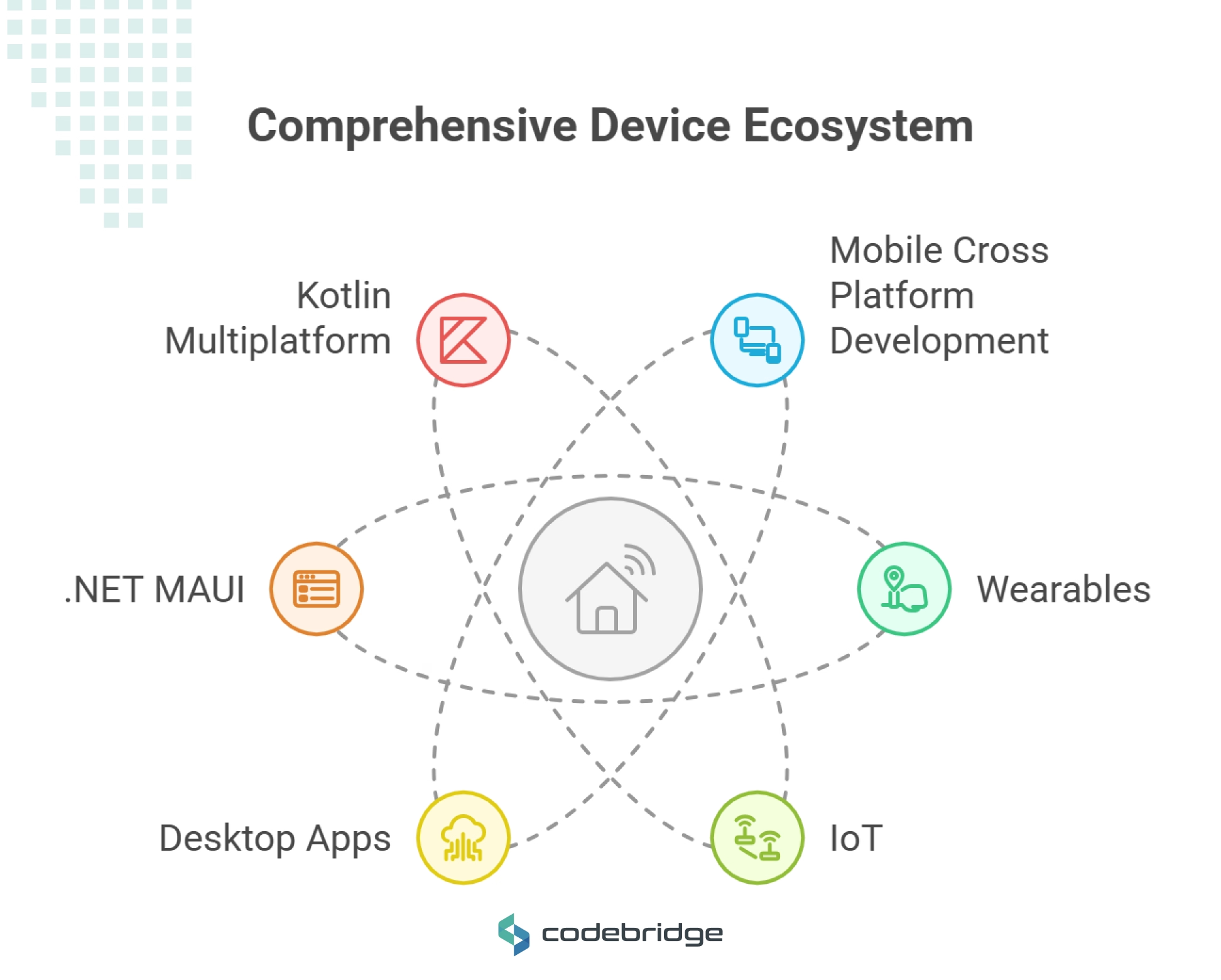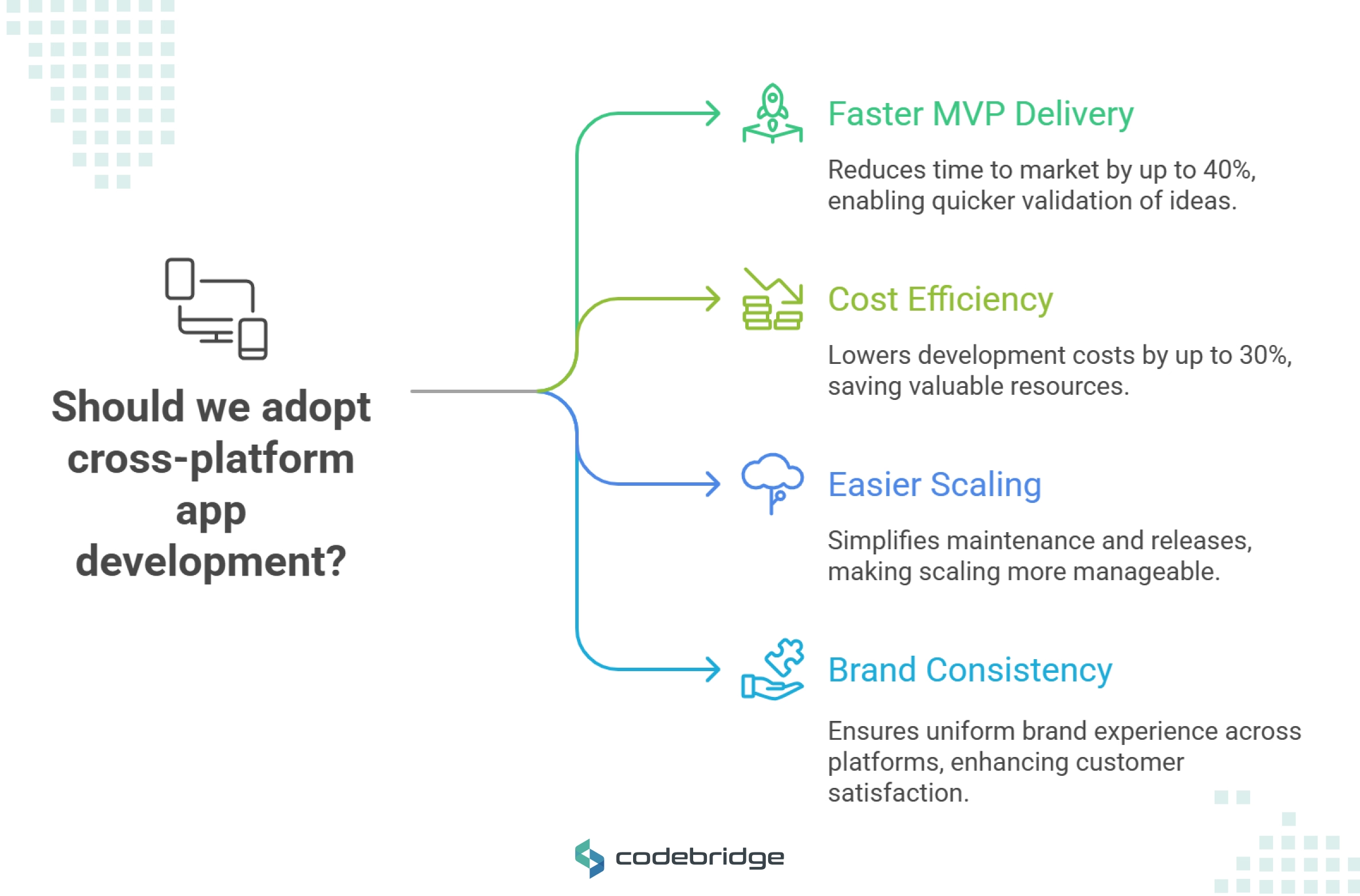For startup founders, CTOs, and technical decision-makers, the debate between cross-platform vs native app development has never been more important. The explosion of options for app development cross-platform, from Flutter to React Native, .NET MAUI, and hybrid solutions, means the decision now impacts cost, speed, future scalability, and the strategic potential of the business. While native app development for iOS and Android offers direct access to platform APIs and tight OS integration, it also brings higher budgets and longer launch cycles, challenging for startups with ambitious timelines and lean teams.
Accelerate your startup’s success with expert App Development Services. Build scalable, high-performing apps with Codebridge.
The 2026 mobile landscape, shaped by AI integration, 5G optimization, and unified UI standards, rewards speed-to-market, maintainability, and flexible product pivots. Modern platform mobile apps built with cross-platform development frameworks now approach native performance for most business cases, leveraging real-world benchmarks and startup success stories. This guide is built for the fast-moving founder: every section is packed with actionable comparisons, decision tools and insights to drive your next platform vs app decision.

Cross-Platform vs Native App Development Frameworks
Choosing between cross-platform app development frameworks and native platforms is a pivotal decision. This choice determines your app's speed to market, maintainability, user reach, and scalability as your business grows. Let's explore both options and the "third way": hybrid mobile apps, to clarify what makes sense for most modern startups.
What Is Cross-Platform Development?
Cross-platform development lets startups build a single codebase that generates cross-platform apps for iOS, Android, and more. Frameworks like Flutter, React Native, .NET MAUI, and Kotlin Multiplatform deliver mobile cross platform app development with broad coverage, shared talent pools, and leaner maintenance, making it the foundation of many startup strategies.
What Is Native App Development?
Native app development means building separate apps for each platform mobile app (iOS/Android), using official tools like Swift/Objective-C or Kotlin/Java. The result is ultra-smooth mobile native apps with deep hardware integration and immediate access to new OS features, but requiring more time, larger teams, and bigger budgets.
Hybrid Mobile Apps: The “Third Path”
Hybrid mobile apps are built in web technologies (HTML/CSS/JS) and wrapped in a native container (e.g., Ionic, Cordova). They offer fast prototyping but lower performance and limited access to platform APIs. In most cases, hybrid mobile app vs native app comes down to speed and simplicity for basic business tools, while modern startups prefer cross-platform frameworks for scalability.
Leading Frameworks Compared
Flutter vs React Native: Cross-Platform vs Native Performance and Developer Experience
When comparing cross platform vs native performance, startups must review real benchmarks, developer experience, and project fit.
Performance Benchmarks
- Cross-platform app development mobile approaches now reach near-native UI smoothness in business apps.
- For GPU-heavy gaming, native vs hybrid app and native vs cross-platform may favor native.
Developer Speed & Reusability

- Flutter: Hot reload, 90% code reuse. 2-week onboarding for Dart newcomers.
- React Native: JS/TS skills apply directly, speeding MVP cycles. 85% shared code.
- Both support app development multiple platforms with unified teams and less duplication.
Community & Ecosystem

- React Native: 210k+ GitHub stars, mature npm ecosystem.
- Flutter: 170k+ stars, strong Google support, pub.dev archives.
- .NET MAUI and Kotlin Multiplatform are gaining ground in enterprise and fintech.
Native vs Hybrid Mobile Apps vs Cross-Platform: 2026 Real Benchmarks
Let's put native vs hybrid mobile apps vs cross-platform apps in perspective for budget, schedule, and UI quality.
Time-to-Market & Cost
- Native mobile app vs web app: native offers optimal performance but costs more and launches later.
- Mobile app cross platform development is 35–40% cheaper and 40% faster for MVPs and feature updates.
Maintenance & Scalability
- Cross-platform apps development means one codebase, easier bug fixes, and cheaper updates.
- Native apps vs hybrid apps need separate pipelines, longer QA, and dual team coordination.
Third-Party Integrations
Modern mobile cross platform development frameworks (Flutter, React Native) support plugins for Stripe, Firebase, AI, and more, matching the flexibility of native platforms, crucial for startups needing fast pivots and integrations.

Cross-Platform vs Native Mobile App: Business Impact and ROI
Your technology choice has real, long-term business consequences.
Key Startup Factors

- Budget: Lean teams can’t staff multiple native teams.
- Timeline: MVP deadlines favor app cross platform approaches.
- Market Reach: Codebridge helps startups deploy fast to both iOS and Android.
- Long-Term Viability: Frequent updates are cheaper and easier with shared code.
Startup Success Stories
- Shopify Seller used React Native to unify mobile and web logic, raising retention.
- Netflix adopted Flutter for its media UI, cutting bug rates by 40% and improving update speed.
- Discord scaled its voice client globally on React Native.
- Statista reports over 65% of global business apps in 2025 are now built in cross platform apps frameworks (DR 90).
Cost Comparison (2-Year Total)
Interactive Decision Tool: Cross-Platform vs Native for Startups
flowchart TD
A[Budget < \$100k?] --Yes--> B[Choose Cross-Platform]
B --> C[Timeline < 3 months?] --Yes--> D[Cross-Platform]
C --No--> E[Consider native/hybrid]
A --No--> E[Consider native/hybrid]
E --> F{Need device-specific hardware/advanced AR?} --Yes--> G[Native]
F --No--> D[Cross-Platform]
- If speed, cost, and broad reach matter, mobile app cross platform development wins.
- If bleeding-edge hardware integration, gaming, or AR is core, consider native.

2026 Technology Trends: AI, 5G, and Future-Proofing in Mobile Cross Platform App Development
The future of application cross platform solutions is defined by rapid tech shifts.
AI Integration
- Both cross platform app development mobile and native app development now integrate TensorFlow Lite, CoreML, ONNX, PyTorch plugins for real-time AI and personalization.
- Flutter and React Native make onboarding AI features easier through community plugins.
5G Optimization
- Real-time communication, AR, and cloud sync need seamless 5G failover.
- Best cross platform mobile development frameworks handle network latency and enable faster media streaming with modern plugin support.
Device Ecosystem Coverage

- Mobile cross platform development extends to wearables, IoT, and desktop apps through platform independent development.
- .NET MAUI and Kotlin Multiplatform allow businesses to reuse logic across phone, tablet, and laptop.
Progressive Web Apps (PWA) and Hybrid Evolution
- PWABuilder and Capacitor drive hybrid apps vs native apps advances, allowing installable web apps with offline sync and push notifications.
- The line between platform mobile apps and PWAs is thinning, ideal for startups focused on rapid market entry.
Application Cross Platform and Startup-Specific Recommendations

- app cross platform development lets startups deliver MVPs up to 40% faster and 30% cheaper.
- Lower maintenance and unified releases make scaling easier, even for non-tech teams.
- Brand consistency and smoother updates mean better customer satisfaction.
Codebridge: Your Cross-Platform Partner
Codebridge specializes in best cross platform mobile development, from MVPs to complex business apps.
Our team leverages mobile app development cross platform best practices, and frameworks proven in global startup success, a partner for long-term growth, cost control, and high-impact launches. For detailed information, explore our Case Studies.
Code Example: Best Cross Platform for Mobile Development
Flutter Button Component
class StartupButton extends StatelessWidget {
final String label;
final VoidCallback onPressed;
const StartupButton({required this.label, required this.onPressed});
@override
Widget build(BuildContext context) => ElevatedButton(
style: ElevatedButton.styleFrom(primary: Colors.blueAccent),
onPressed: onPressed,
child: Text(label, style: TextStyle(fontSize: 16)),
);
}
React Native Bridgeless Native Module
import { NativeModules } from 'react-native';
const { DeviceInfoModule } = NativeModules;
export async function getDeviceSerial(): Promise<string> {
return await DeviceInfoModule.getSerialNumber();
}
Kotlin Multiplatform Shared Network Logic
package com.startup.shared
import io.ktor.client.*
import io.ktor.client.request.*
class NetworkClient(private val client: HttpClient) {
suspend fun fetchData(endpoint: String): String {
return client.get(endpoint)
}
}
Why Startups Should Choose Between Cross-Platform vs Native in 2025?
Real-world performance benchmarks, cost breakdowns, and industry trends now all favor mobile cross platform development for most startups. While native mobile app approaches offer unmatched integration and performance for cutting-edge games and AR, the majority of apps thrive with best cross platform for mobile development frameworks, delivering speed, savings, and market flexibility. Codebridge is your partner for app development multiple platforms, ensuring every new product enjoys best-in-class launch speed, maintainability, and future-readiness.
Ready to build your next cross-platform mobile application? Contact Codebridge for a free strategy session and see how cross platform apps can transform your MVP, business app, or digital product in 2025.
FAQ
What is the difference between cross-platform and native app development for startups?
The key difference lies in how the app is built and deployed. Native app development uses platform-specific languages like Swift (iOS) or Kotlin (Android) to create apps with maximum performance and deep OS integration. Cross-platform development, on the other hand, allows startups to build once and deploy across multiple platforms using frameworks like Flutter, React Native, or .NET MAUI. This approach reduces development time by up to 40% and costs by 30–50%, making it ideal for startups focused on fast MVP delivery and scalability.
Which is better in 2026: Flutter, React Native, or native development for startup apps?
Flutter and React Native deliver near-native performance for most business use cases. Flutter stands out with its Skia rendering engine, consistent UI across devices, and strong performance (59–60 FPS in benchmarks). React Native benefits from JavaScript/TypeScript familiarity and a massive ecosystem, making MVP cycles faster. Native development is still better for GPU-heavy games, AR, or advanced hardware integration, but for startups aiming for speed, cost-efficiency, and cross-platform reach, Flutter or React Native are usually smarter choices.
How do cross-platform frameworks like Flutter and React Native compare in performance and cost?
Modern cross-platform frameworks have closed the performance gap with native apps.
Benchmark data shows:
- Flutter: 59–60 FPS, 25 MB memory usage, ~14% battery drain.
- React Native: 53–56 FPS, 30 MB memory usage, ~16% battery drain.
- Native: 60+ FPS, 20 MB memory usage, ~12% battery drain.
In cost terms, cross-platform apps are 35–40% cheaper to develop and launch up to 40% faster than native apps, which is why most startups favor cross-platform frameworks for their first releases.
When should startups choose cross-platform vs native app development?
Choose cross-platform when your startup:
- Has a budget under $100 K
- Needs to launch within 3–6 months
- Targets both iOS and Android users simultaneously
- Requires fast updates and shared code maintenance
Choose native if your app depends on:
- Advanced AR/VR or gaming
- Complex device hardware (e.g., camera, sensors)
- High-frequency real-time data processing
A startup’s timeline, funding, and scalability goals are the deciding factors.
What are the ROI and time-to-market benefits of cross-platform development for startups?
Cross-platform app development offers a faster ROI by reducing:
- Initial costs (by up to 45%)
- Maintenance expenses (one codebase, one team)
- Time-to-market (launch 40% faster than native)
Over two years, the total cost averages $106 K for cross-platform versus $180 K for native apps.
For startups, this translates to earlier market entry, faster user feedback, and quicker product-market fit.
How are AI, 5G, and new technologies shaping cross-platform app development in 2026?
AI and 5G are redefining the mobile app ecosystem. In 2026, frameworks like Flutter and React Native integrate easily with TensorFlow Lite, CoreML, and ONNX, enabling AI-driven personalization and automation. 5G networks enhance real-time streaming, AR, and IoT synchronization, while tools like .NET MAUI and Kotlin Multiplatform extend app logic across mobile, web, and wearables. Together, these advances make cross-platform apps future-ready, blending scalability with intelligent, high-speed performance.

















